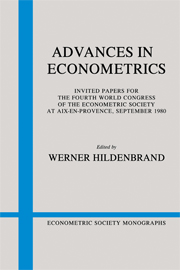Book contents
- Frontmatter
- 1 Qualitative response models
- 2 The identification problem in econometric models for duration data
- 3 The effects of time in economic experiments
- 4 Some recent developments on the distributions of single-equation estimators
- 5 Best uniform and modified Padé approximants to probability densities in econometrics
- 6 Identifiability and problems of model selection in econometrics
- 7 Causality, exogeneity, and inference
- 8 Generating mechanisms, models, and causality
- 9 Comparing alternative asymptotically equivalent tests
- 10 Conflict among testing procedures in a linear regression model with lagged dependent variables
- 11 Macroeconomic modeling based on econometric and simulation models for the Polish economy
6 - Identifiability and problems of model selection in econometrics
Published online by Cambridge University Press: 05 January 2013
- Frontmatter
- 1 Qualitative response models
- 2 The identification problem in econometric models for duration data
- 3 The effects of time in economic experiments
- 4 Some recent developments on the distributions of single-equation estimators
- 5 Best uniform and modified Padé approximants to probability densities in econometrics
- 6 Identifiability and problems of model selection in econometrics
- 7 Causality, exogeneity, and inference
- 8 Generating mechanisms, models, and causality
- 9 Comparing alternative asymptotically equivalent tests
- 10 Conflict among testing procedures in a linear regression model with lagged dependent variables
- 11 Macroeconomic modeling based on econometric and simulation models for the Polish economy
Summary
Background and perspective
Econometrics was born in the 1920s, conceived as the embodiment of a noble dream. Today, with the hindsights of more than half a century, this dream gives way to a scenario:
"Economics deals with complex interactive phenomena. It is impossible to study quantitative relationships between important variables (say, taxation vs. savings) without reference to the context. Nor is it possible to perform experiments or make direct observations that would isolate such relationships or at least diminish the noise level under which their effects can be observed. We possess, however, innumerable time series engendered by the very economic forces we wish to uncover. By constructing models for time series we may hope to gain indirect access to the desired quantitative economic relationships because these are intrinsic in the models and therefore should be recoverable from the structure and parameters of the models. Economic truths are immutable, at least in the short run, and thus there is no reason, in principle, why accurate models cannot be deduced from the available data, in spite of disturbances, errors, irrationalities, expectations, and other random influences which contaminate economic time series."
This scenario forces the conclusion that the study of economics is a system-theoretic endeavor. Economics as a science must be built on methods that are effective in the exploration and explanation of interactive phenomena. The dream of econometrics has evolved into a technical problem in system theory.
But, unfortunately, the actual evolution of econometrics took a rather different route. System theory was not even in sight in the 1920s and 1930s, and econometrics soon came to be dominated by statistics. The aspiration of Haavelmo (1944) to give a solid foundation to econometrics by dogmatic application of probability theory has not been fulfilled (in the writer’s opinion), no doubt because probability theory has nothing to say about the underlying system-theoretic problems.
- Type
- Chapter
- Information
- Advances in Econometrics , pp. 169 - 208Publisher: Cambridge University PressPrint publication year: 1983
- 11
- Cited by



